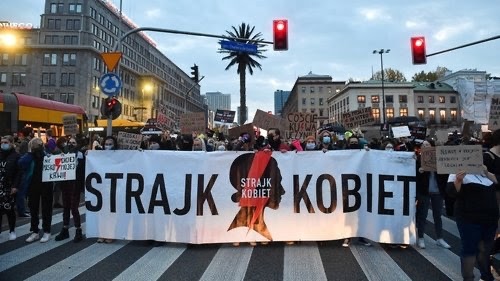Polish women making their marks with lightning bolts
Poland has recently ignited with protests regarding the passage of new laws by its highest court, including some dictating more restrictions on abortion. Poland’s conservative leadership situates it as the country with the most regulated laws on abortion in Europe. The right-wing Law and Justice Party, also known as PiS, took office back in 2015. This group is very close to the church, and priests in several communities have been in positions of power for years.
Abortion in Poland was legalized in 1956 due to high mortality rates and lack of contraceptives. After the fall of communism in 1993, abortion was outlawed, except in the cases of rape, incest, health risks for the mother or deformity of the child. Protests erupted when Polish lawmakers recently decided to revise the 27-year-old law, prohibiting the abortion of children with severe deformities.
The government pushed the new law without any public consultation or parliamentary debate. Some believe that the church is behind this new law, but the influence of the church has diminished through the years, as the younger generation agrees with the separation of church and state.
In Poland, there are only about 2,000 legal abortions per year, two percent of which are due to deformities of the fetus, aljazeera.com reports. Roughly 200,000 abortions occur illegally or abroad.
On Oct. 30, a large protest occurred in Warsaw, Poland, in which women marched for their rights to bodily autonomy. Other mass protests took place in cities across Poland. Some churches were vandalized, and almost half a million people showed up to disrupt church services on Oct. 25. Women refused to compromise their reproductive rights, dressing in black and using a red lightning bolt as a symbol of revolt.
Guilford students shared their thoughts on the protests.
“I know that Poland is going through a lot right now, add COVID on top of it,” said senior German and forensics major Kenzie Steelee. “I think that Poland needs to come to a compromise so that women will get the liberty they want.”
“Women should have the right to their own bodies,” added senior education major Remy Branscum. “Pro-choice helps in this matter because you can choose if you want to have an abortion or not. It shouldn’t be up to religious beliefs.”
Polish Politician and Leader of the Law and Justice Party Jaroslaw Kaczynski, has the final say in this matter, and has asked his conservative supporters to oppose the protesters. Polish President Andrzej Duda spoke up about the protests as well, saying that there should be legal measures in place to calm the protesters. President Duda is also trying to push an amendment to legalize abortion in the case of fetuses with “lethal defects.”
Amnesty International, the namesake of a Guilford College club that helps to fight injustices around the world, has condemned Poland’s decision on the near ban on abortion.
The protests have caused increased worry about the coronavirus, as roughly 21,000 new cases have been reported. With the closing of bars, restaurants and colleges, Poland is making an effort to keep numbers low.
As COVID-19 cases rise, however, protests may not stop until Poland comes up with a satisfactory compromise.











